Importance of Data Privacy in Cybersecurity
By MYBRANDBOOK
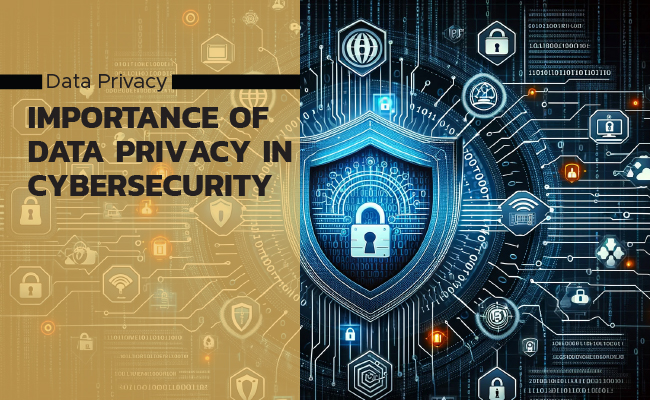
In today’s digital landscape and growing digital economy businesses are increasingly reliant on the internet and cloud services. Cyberattacks pose an ever-growing threat to businesses across all sectors. From ransomware to malware, phishing, and denial of service attacks, the range and complexity of cyber threats continue to evolve at an alarming rate.
Cyber threats have been a major concern for businesses for decades. Data breaches and malware attacks can cause significant financial damage and reputational harm. So, cybersecurity companies developed solutions to prevent these attacks, often prioritizing creating strong barriers around data.
The growing importance of data privacy in securing data against cyber theft cannot be overstated. Protecting personal data such as Aadhar Card, financial information, and health records is essential to prevent identity theft and fraud. At the same time, corporate need to secure intellectual property, trade secrets, and strategic business information prevents industrial espionage and competitive disadvantage.
With the increasing volume of data generated and shared across organizations, protecting personal information and maintaining privacy has become a critical concern. The market aims to provide organizations with robust tools and solutions to manage data privacy risks, ensure compliance with regulations such as the General Data Protection Regulation (GDPR) and California Consumer Privacy Act (CCPA), The CCPA has been updated to CPRA ( California)since 2023 and build trust with customers.
The driving factor behind the growth of the data privacy software market is the surge in data privacy regulations worldwide. Governments and regulatory bodies are implementing stricter data protection laws to safeguard individuals’ personal information. Organizations are compelled to adopt data privacy software to meet these regulatory requirements and avoid hefty fines and reputational damage.
Data Privacy concerns are rising due to increasing data breaches, and business are taking certain steps to protect their data. A survey states that, around 95% business stated that privacy was an important factor for their business growth. While cybersecurity has been prominent for the past two decades, the protection of PII and PHI is gaining significance. Synthetic frauds are on the rise, necessitating proactive measures to safeguard sensitive data.
In the fast-paced world of technological advancement, the rise of Artificial Intelligence (AI) heralds a new era of innovation across various sectors. AI is reshaping the way we interact with technology and each other. However, amidst this transformative wave, a critical concern looms large: data privacy.
India’s Digital Personal Data Protection (DPDP) Act marks a critical juncture in the nation’s approach to privacy and data protection, aligning with global standards for the safeguarding of personal information. Another key component of the DPDP Act is the requirement for organizations to demonstrate compliance with privacy principles. This is where the ability to involve AI in detecting. Identifying and confirming privacy compliance becomes invaluable. Such features simplify the compliance process, providing enterprises with a tool to generate verifiable documents that prove adherence to the required privacy standards and processing policies. This not only serves as proof of commitment to protecting personal data but also streamlines compliance audits and can help build trust with customers and partners.
Automated privacy compliance should reflect a detailed and up-to-date understanding of the DPDP Act’s requirements. They need to ascertain various elements, such as name and address records, data minimization practices, and data retention periods, and should be generated in a manner that is both understandable to the customer and regulators. A pivotal element in the compliance with such regulations is the capacity for Confidential Data Redaction. This process involves intelligently obscuring personal data within data ecosystem and documents to prevent unauthorized access or accidental disclosure, thereby protecting individual privacy.
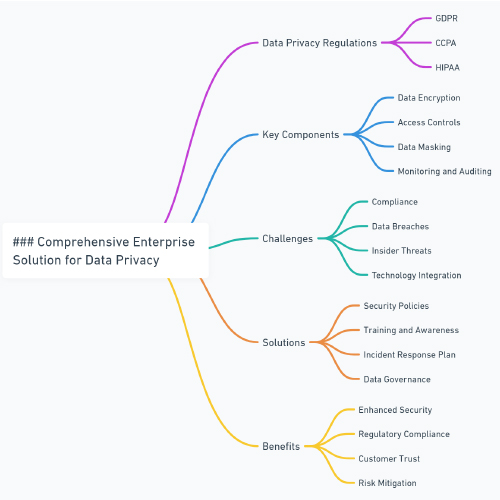
An enterprise solution for Confidential Data Redaction under the DPDP Act must be digitally complete, encompassing not just the technology to redact personal information but also the framework that ensures its correct application. Enterprises must deploy solutions that can manage vast amounts of data across various formats and systems(un-structured, semi-structured and structured), from customer databases to employee records. The tools must integrate with existing data storage and processing infrastructures, providing seamless redaction capabilities without disrupting business operations. The products must also offer scalability to manage future increases in data volume and adaptability to accommodate new types of personal data as they emerge.
Corporations have sensitive data that needs to be secured, the data categorized into 3 segments: Employee, Customer and Company Data. Redaction of sensitive information is the first step in securing Personal Identifiable information (PII). Redacting unnecessary information brings an elevated level of security for customers and their customers.
As an example. A corporation has stored customer data relative to PII. The corporation may or mayn’t have a need for this data but as long as they store the data, they are required by GDPR regulation to protect the data based on customer preferences. Redacting the PII data greatly reduces risk, meets compliance requirements and mitigates against loses arising from possible breach of PII data lawsuits.
Corporations receive and store customer data from time to time that needs to be redacted to meet with risk and compliance requirements. As an example, a customer of a bank might send an email to an employee of his/her banking organization, and share personally identifiable information, like SSN/Credit Card and/or Driving License. The bank immediately becomes responsible to safeguard the customer’s information. GDPR regulation( Global) requires the corporation to ensure that important PII data is protected. One way to protect the corporation and the customer is to redact the sensitive information - while the data is stored.
AI and ML can safeguard owners Data
The fastest-growing segment in the global data privacy software market is Risk Management. Data privacy risk management applications help organizations identify, assess, and mitigate potential risks associated with data privacy and security. AI- powered privacy technologies will be used for identifying and preventing cyber threats. Organisations are using AI and ML for identifying potential data privacy risks by getting recommendations, prompts and trends across data through the AI and LM algorithms. Also, these algorithms can rapidly analyze large datasets, identify patterns, and adjust to emerging regulations, making it an effective tool for mitigating privacy risks.
As data breaches and privacy violations continue to make headlines, organizations are prioritizing risk management strategies to protect their valuable data assets. These applications provide functionalities such as risk assessment, data classification, vulnerability scanning, and privacy impact assessments. By proactively managing data privacy risks, organizations can enhance their overall data protection posture and ensure compliance with regulations.
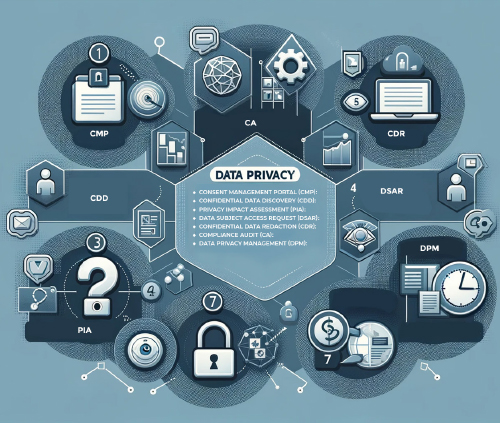
Rising adoption of IOT devices to Aid Global Data Privacy Software market growth
The data security management software demand is growing owing to rising IoT devices across industries such as manufacturing, BFSI, healthcare and others. The proliferation of IoT-connected devices, which are expected to increase to 43 billion, presents both tremendous opportunities and significant challenges in terms of data privacy and cybersecurity. Similarly, the vast implementation of 5G technology is expected to drive opportunities for key players in the market to expand their offerings.
Addressing Restraining Factors
The growth of the data privacy software industry is hindered by low awareness and insufficient knowledge, particularly among small and medium enterprises (SMEs), local organizations, and startups. . Enterprises and SMEs face significant challenges in processing customer personal data and insights due to several factors, including lack of awareness about available software, budget constraints, and limited IT infrastructure.
Technological innovation and advancements can significantly optimize the performance of data privacy software, making it more appealing for a variety of downstream applications. Understanding consumer behavior and market dynamics also plays a critical role in identifying opportunities and addressing challenges in the data privacy software market.
With the increasing number of data privacy regulations worldwide, organizations across industries are investing in data privacy software to manage compliance requirements effectively. These applications provide features such as data mapping, consent management, incident response, and auditing capabilities, allowing organizations to maintain regulatory compliance and mitigate potential risks.
Regions are leading the Data Privacy Software Market?
◆ North America (United States, Canada and Mexico)
◆ Europe (Germany, UK, France, Italy, Russia and Turkey etc.)
◆ Asia-Pacific (China, Japan, Korea, India, Australia, Indonesia, Thailand, Philippines, Malaysia and Vietnam)
◆ South America (Brazil, Argentina, Columbia etc.)
◆ Middle East and Africa (Saudi Arabia, UAE, Egypt, Nigeria and South Africa)
Opportunities ahead:
India’s Digital Personal Data Protection Act (DPDPA) of 2023 is part of a global trend towards stricter data privacy laws. Regulations like GDPR and CCPA are influencing how companies handle user data worldwide, and India’s framework needs to keep pace.
As the digital landscape continues to evolve, the role of Privacy Impact Assessment (PIA) will become increasingly important in navigating the complex interplay between technological advancement and privacy protection. The journey ahead will require ongoing commitment, collaboration, and innovation from all stakeholders involved. By embracing these challenges and opportunities, India can aspire to set a global standard for privacy and data protection in the digital age.
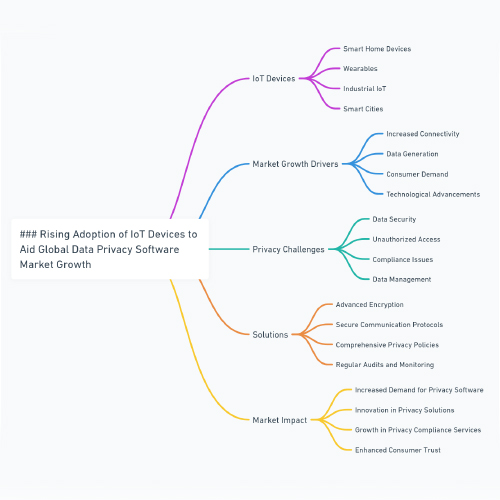
The concept of Privacy Impact Assessment (PIA) appears as a cornerstone in understanding and mitigating the risks associated with data processing activities. Within the proposed framework of the Data Protection Bill in India, PIA is envisaged to play a significant role in ensuring that data processing respects privacy rights and follows legal obligations.
The Bill mandates that certain categories of data fiduciaries undertake impact assessments for significant data processing activities. These activities include those that involve sensitive personal data, carry risks of significant harm to individuals, or involve large-scale profiling or use of biometric data.
Key features of Data Privacy ( SEVEN CORE COMPONENTS)
◆ Consent Management Portal (CMP):
◆ Confidential Data Discovery (CDD):
◆ Privacy Impact Assessment (PIA):
◆ Data Subject Access Request (DSAR):
◆ Confidential Data Redaction (CDR):
◆ Compliance Audit (CA):
◆ Data Privacy Management (DPM):
With the implementation of the DPDP Act, it is imperative for companies operating in India to deploy solutions that not only comply with local regulations but also foster trust and ensure the privacy of individual data.
Data Privacy Software Market Regional Insights
The dominating region in the global data privacy software market is North America. North America has a strong presence of major technology companies and a well-established regulatory framework for data privacy. The region is witnessing significant adoption of data privacy software solutions due to the increasing emphasis on data protection and compliance with regulations such as the General Data Protection Regulation (GDPR) in Europe and the California Consumer Privacy Act (CCPA) in the United States. The presence of stringent data privacy regulations, high awareness among organizations regarding data protection, and the need to safeguard customer information are driving the growth of the data privacy software market in North America.
Some of the major data protection regulations around the world GDPR- Global, CPRA- California, PDPA- Asia pacific, NESA- Middle East and DPDP- India
The fastest-growing region in the global data privacy software market is the Asia Pacific. The region is experiencing rapid digital transformation, coupled with the introduction of data privacy regulations in countries like India, China, and South Korea. The increasing number of cyber threats and data breaches has compelled organizations in the Asia Pacific to adopt data privacy software solutions to ensure the security and privacy of their data. Moreover, the growing awareness among enterprises about the importance of data protection and the need for compliance with regional data privacy laws is driving the demand for data privacy software in the region.
Data Privacy Software Market Top Player’s Company Profiles
Amazon Macie (U.S.A.) Onetrust LLC (U.S.A.)
BigID, Inc. (U.S.A.) Proofpoint, Inc. (U.S.A.)
Data Safeguard (U.S.A.) Securiti.AI (U.S.A.)
Forcepoint (U.S.A.) Trust ARC Inc. (U.S.A.)
Immuta (U.S.A.) Varonis Systems, Inc. (U.S.A.)
Data Privacy Software Key Market Trends
Adoption of AI and ML: The integration of AI and ML technologies in data privacy software is gaining traction. These technologies enhance threat detection and response capabilities, enabling proactive identification of potential data breaches and security incidents. AI and ML algorithms can analyze vast amounts of data, identify patterns, and detect anomalies, helping organizations strengthen their data privacy defenses.
Focus on Data Subject Rights and Consent Management: With the introduction of data privacy regulations, there is an increased emphasis on individuals’ rights over their personal data. Data privacy software solutions incorporate features that enable organizations to effectively manage data subject rights, such as consent management and data access requests. This trend reflects the growing importance of transparency and accountability in data handling practices and aligns with the principles of data privacy regulations.
Key-Takeaways:
The global Data Privacy Software market is experiencing transformative trends driven by the growing awareness of data privacy regulations, the increasing volume of sensitive data, and the need for organizations to comply with evolving privacy standards. Another significant trend is the emphasis on AI-driven data discovery and classification. Advanced algorithms and machine learning are employed to automatically discover and classify sensitive data, enhancing accuracy and efficiency in compliance efforts.
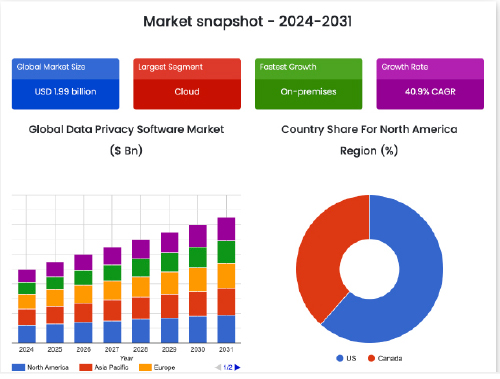
The adoption of Data Privacy laws, such as the Data Protection and Digital Privacy (DPDP) Act, opens up numerous opportunities for tech companies to develop innovative solutions and services that help businesses comply with data privacy regulations. By focusing on compliance management, data security, privacy management, and education, tech companies can drive growth and enhance their offerings in the market.
Road Ahead: The year 2024 marks a significant shift in data privacy trends globally. With increasing concerns over data breaches, identity theft, and misuse of personal information, governments and regulatory bodies have been taking proactive measures to enhance data protection laws. This includes imposing stricter regulations on data handling practices, enhancing transparency and accountability requirements for businesses, and empowering individuals with greater control over their personal data. These trends are reshaping the landscape of data privacy and urging organizations to prioritize security and compliance in their operations.
Indeed, the expansion of the right to be forgotten reflects a growing recognition of individuals’ autonomy over their personal information. This trend is particularly significant in an age where digital footprints are increasingly permanent and pervasive. By allowing individuals to request the deletion or removal of their data from online platforms and databases, jurisdictions are empowering individuals to exercise greater control over their digital identities and mitigate potential privacy risks.


Legal Battle Over IT Act Intensifies Amid Musk’s India Plans
The outcome of the legal dispute between X Corp and the Indian government c...

Wipro inks 10-year deal with Phoenix Group's ReAssure UK worth
The agreement, executed through Wipro and its 100% subsidiary,...

Centre announces that DPDP Rules nearing Finalisation by April
The government seeks to refine the rules for robust data protection, ensuri...

Home Ministry cracks down on PoS agents in digital arrest scam
Digital arrest scams are a growing cybercrime where victims are coerced or ...


Icons Of India : AMIT CHADHA
Amit Chadha serves as the CEO and Managing Director of L&T Technology ...

Icons Of India : Deepak Sharma
Deepak Sharma spearheads Schneider Electric India. He brings with him ...
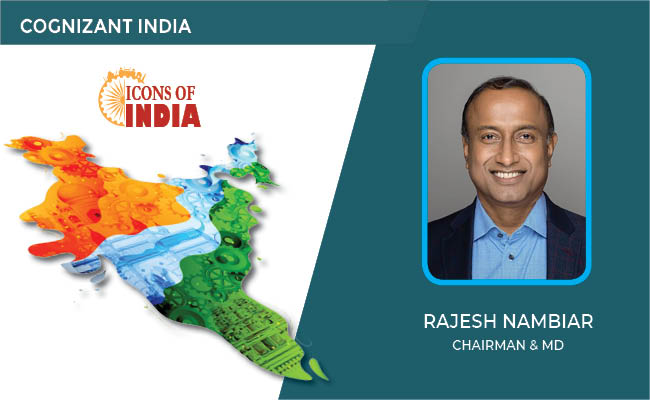
ICONS OF INDIA : RAJESH NAMBIAR
Rajesh leads the company’s India associates and enhances relationshi...


GSTN - Goods and Services Tax Network
GSTN provides shared IT infrastructure and service to both central and...

IFFCO - Indian Farmers Fertiliser Cooperative
IFFCO operates as a cooperative society owned and controlled by its fa...

C-DOT - Center of Development of Telematics
India’s premier research and development center focused on telecommu...


Indian Tech Talent Excelling The Tech World - AJAY BANGA, President - World Bank
Ajay Banga is an Indian-born American business executive who currently...

Indian Tech Talent Excelling The Tech World - PADMASREE WARRIOR, Founder, President & CEO - Fable
Padmasree Warrior, the Founder, President, and CEO of Fable, is revolu...

Indian Tech Talent Excelling The Tech World - Steve Sanghi, Executive Chair, Microchip
Steve Sanghi, the Executive Chair of Microchip Technology, has been a ...
 of images belongs to the respective copyright holders
of images belongs to the respective copyright holders